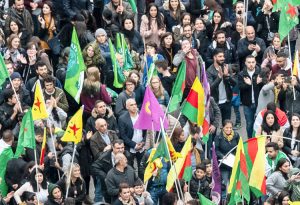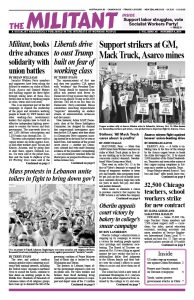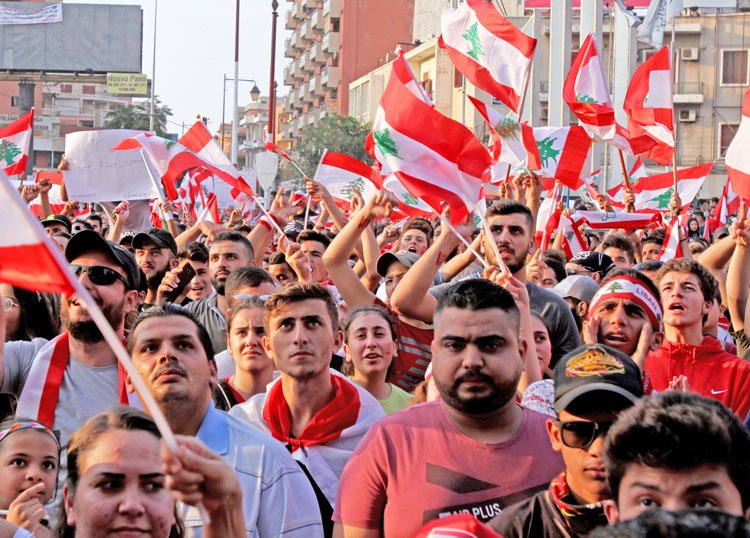The wars and political conflicts among capitalist rulers competing to advance their national interests, including the Turkish rulers’ invasion in northeast Syria to assault the Kurds, continue to bear down on working people in the Middle East. Hundreds of thousands of Lebanese toilers of all religious groups have risen up to demand the fall of the governing coalition of Prime Minister Saad al-Hariri that is backed by both Washington and Tehran.
The protests in Lebanon began after the government imposed a new tax on phone calls. For years workers and farmers there faced declining living standards; government moves to scapegoat and deport some of the 1.5 million refugees that fled Syria’s civil war; and foreign interventions by the rulers of the region’s rival capitalist powers who seek to bring Lebanon under their domination.

“Neither Saudi, nor Iran will be able to take this protest down,” chanted demonstrators in Beirut Oct. 20. Hariri’s government depends on loans from the Saudi monarchy and its allies in the Gulf, who press him to push back against the influence of Tehran-backed Hezbollah in his ruling coalition.
Hezbollah is a capitalist political party that seeks to set up a government in Lebanon modeled on the bourgeois clerical regime in Tehran, its main backer and a fierce rival of the Saudi monarchy. Its militias fight alongside Tehran’s forces in Syria’s civil war, helping Syrian President Bashar al-Assad reimpose his brutal rule over the country. Hezbollah’s leadership boasts its rockets can hit any target in Israel.
In July the Washington-led International Monetary Fund said further loans would be hostage to Hariri pressing ahead with cuts in social measures that working people rely on, including a hike in sales taxes, freezing early retirement for workers in the public sector and eliminating electricity subsidies.
Unemployment among those aged under 35 stands at 37%, while working people bear the brunt of daily electricity outages and sporadic water supplies.
Once protests started, they rapidly expanded their political reach, demanding a halt to corruption and the government’s resignation. Hariri rapidly pulled back the phone tax hike, and then cut the salaries of ministers and lawmakers in half Oct. 21, but thousands continued to protest.
“We are remaining in the streets. We don’t believe a single word he said,” teacher Maya Mhana told Reuters.
Demonstrators demanding Hariri’s fall come from all religions. In the largely Shiite neighborhoods dominated by Tehran-backed Hezbollah in southern Lebanon protesters targeted its offices.
Hezbollah head Hassan Nasrallah attacked the calls for the government to resign Oct. 19. “Nasrallah is one of them,” responded demonstrators in the city of Tyre. Washington has imposed sanctions on Hezbollah officials, part of its squeeze on Tehran aimed at pushing back the Iranian rulers’ military interventions in the region.
Washington eyes Syrian oil fields
While Washington has begun moving 1,000 troops in Syria out of the way of a Turkish government invasion targeting Kurds, the U.S. rulers are reinforcing their military position elsewhere across the region. Since May they have deployed an extra 14,000 troops to the Mideast, along with Patriot air and missile defense batteries, B-52 bombers and a carrier strike group.
The Pentagon also announced it is considering redeploying hundreds of U.S. troops back to northeast Syria. They would be tasked with defending Syria’s oil fields, which are held by the Kurdish-led Syrian Democratic Forces. The Assad government, backed by Moscow, has long coveted these resources. Some 200 mercenaries sent by Moscow to try and retake the SDF-held oil fields in Deir el-Zour province were killed in U.S. airstrikes last year.
Washington’s air power will “prevent our adversaries Russia and Iran from exploiting this situation and protect our partners on the ground,” said Sen. Jim Inhofe, Oct. 19.
“The Socialist Workers Party demands Ankara get out of the Syrian Kurds territory,” Seth Galinsky, SWP candidate for New York City public advocate, told the Militant Oct. 22. “We support the Kurds’ fight for national sovereignty in Syria and throughout the region.
“Washington should immediately and unconditionally withdraw all U.S. forces from the Mideast,” he said. “Its intervention serves the interests of the U.S. capitalist rulers, not those of working people either there or here at home.”


